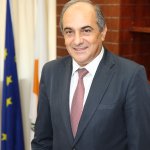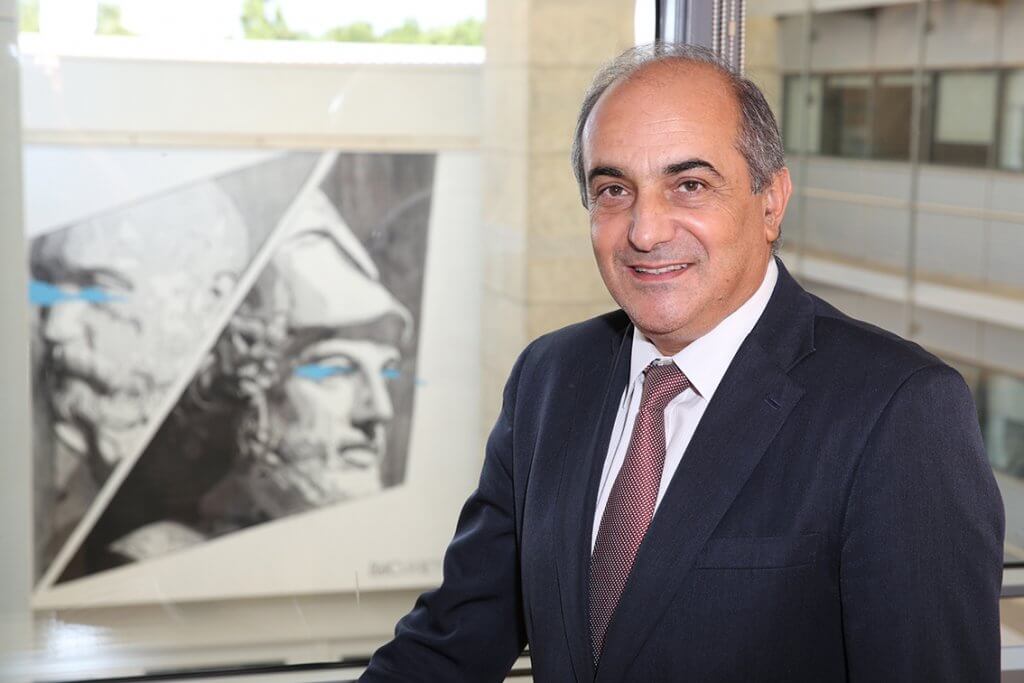DEMETRIS SYLLOURIS: “IN 20 YEARS, CYPRUS WILL BE THE MOST PROSPEROUS COUNTRY IN THE EUROPEAN UNION”

- Is your current position as a PP of Cyprus the result of a long journey in politics or is it the result of circumstances? Were you planning to become a politician?I was always interested in politics, even before I got to the university. I realised from a very young age that my country faced a lot of danger from Turkey. Here, I want to be very specific. So, it was my will from the very beginning to be involved in it somehow. Politics became my main activity many years ago and, as a politician, I was elected 6 times in parliament. I believed that everybody should be involved in politics because that is the way to defend your country.
I know that you have a technical education involving mathematical thinking. How does it help you in your political career?
At the time, we called it the practical section of gymnasium, which involved a lot of mathematics, chemistry and physics. In England, I studied civil engineering because I like mathematics the most and mathematics is the basis of engineering; not only engineering, but also many other sciences requiring, first of all, a basic of logic. I think it does help me a lot. I do not distinguish. In the last few decades, people have said that if you are an engineer, it will bring more results. When I was first elected, it was sort of a surprise that an engineer got involved in politics. Now, it is not like that anymore, because a lot of politicians all over the world are engineers.
What is the most difficult part of your current job?
The most difficult part of my job is when discussions or dialogues or arguments are not based on logic, but based on inverted commas or political party ideology. It is difficult when there is a discussion with somebody who wants to pass a message onto the media and from the media to the people rather than to support positions with arguments that are correct.
As the PP, you have to retain a neutral attitude and not take any side, in order to be objective when discussing pressing issues. How do you manage to do this?
I think that I already proved myself by spending 2 years in this chair.
You always have to be objective and I apply the rules, the regulation and the constitution despite whether somebody may like it or not. I would prefer to use the word ‘objective’, not ‘neutral’. I sometimes take sides based on the constitution or the regulations of the parliament and I apply this objectively because my purpose is to control not what the political decision is, but how this decision is taken within the dialogue and the framework of the regulations of parliament.
Can you tell us about some of the key issues that have the highest priority now to be resolved?
I will separate my responsibilities into two axes: one is the operation of the parliament and regulation of everything around it so that we have a smooth operation of the parliament and the other concerns my decision to change a lot of things in the parliament, which I have done since I took this office. For the past two years, I think that we managed to change a lot and I believe that, now, the parliament is operating more efficiently, but we have a lot of things to do and, therefore, I start feeling the time pressure; believing that if this is a year where I am not going to achieve 100% of my targets that I put in place 2 years ago, I should achieve at least 90%.
 Several of your ex-PP tried to find a solution for constructing a new building for parliament, but only you managed to solve this challenge. What did you do to make it happen?
Several of your ex-PP tried to find a solution for constructing a new building for parliament, but only you managed to solve this challenge. What did you do to make it happen?
I can imagine what difficulties my predecessors had trying to solve this issue, with a civil service and operations staff of municipalities, etc. Therefore, I had several meeting with the president and other officials in order to solve this problem. I insisted and was assured that the building of the new parliament will start next year, but, until I see it with my own eyes that the contractor has started work, I will not say that I achieved a result yet.
What is your view on possible solution platforms for resolving the Cypriot-Turkish problem?
I am not optimistic at all and, as the time passes, I am becoming more pessimistic. I believe that Turkey, in general, and especially Mr. Erdogan, has a strategic plan for controlling the whole Eastern Mediterranean and, not only that, considers Cyprus as the base and the centre for his plans. I think its oversimplification to ask how Cypriots, Turks and Greek can solve this problem. The problem is not Turkish and Cypriot. The problem is the Turkish invasion in Cyprus, the presence of the Turkish army, the Turkish settlers who came into the occupied area and the total approach of Turkey. We are seeing Turkey invading Syria, Iraq and other countries, as they want to expand their military presence. So, from what we see, somebody would be very illogical to be optimistic in this case.
What do you think of Cyprus-Russian relations? With the new directives from the U.S. financial department regarding the transparency of all transactions through local banks, many Russian investors have become locked in “on-hold” positions, which is not good for the Cypriot economy. What comments can you offer on this situation?
Well, for the past few decades, Russian-Cypriot relations have been very good and even better sometimes, and we had a lot of help from Russians on the political scene with the Cyprus problem and on the international scene for many other issues. Also, in the economic sector, we had a lot of support from Russia and Russian people. In recent times, it seems that we have had some problems that are not political problems, but problems that we face because of the financial war between US and Russia. Still, we have to try to survive because, being a small country, we cannot take part in this war and we have to save our interests. When two elephants are fighting with each other for the grass, we have to just watch.
Regarding the issue with the banks, the situation is considered not only Russian, but all other nationalities. The issue is that, sometimes, our banks apply rules and regulations more strictly then they should. This is the one issue that I am dealing with and I want to arrange a meeting between the banks, the ministry and business people to see how we can resolve this problem because a lot of Cypriots are suffering with the same problems with the banks as well. We will discuss it with the regulatory authorities. Otherwise, at the end of the day, we will not have a banking system that operates in a way to support businesses, but I want to underline that this situation is not only against Russians.
The Cyprus passport programme has been criticised by other European countries. Are you planning to become stricter with how this programme is implemented in the future?
I think that the term “passport programme” is wrong. As far as it is now, it is “citizenship by investments” and I think it is a very good programme and, as it is now, it is quite satisfactory. The criticism is coming, first of all, from sources that want to support other countries and to lure investors there. I believe that for attracting investors to Cyprus, it is a very good programme, as well as for the European economy and I am actually in favour of expanding this programme, not only for investors, but also for researchers and scientists, especially in artificial intelligence (AI). That will be my next proposal to the government. We should create a citizenship programme by giving opportunities to researchers and scientists to be based in Cyprus, especially in the field of artificial intelligence.
Regarding the changes in the programme, it depends on the government. Recently, the government already made limitations for passports to 700 a year.
I do not understand why other European countries accept thousands of cheap labourers and settlers that change the whole demographic profile of the country and it does not cause problems, but when it comes to Cyprus, they become very sensitive. What problems can it cause for other European countries that we take in 200-300 investors? The answer is that they simply need these investors to go to their countries. When it comes to hundreds of refugees arriving to Cyprus, the EU does not notice this problem. They are only focusing on the couple of hundred potential investors who want to invest in Cyprus and live here. Regarding the refugees, we have received them for the past couple of years. We have a policy based on the EU approach and humanitarian principals and we try to control and deal with this problem. We all know that most of these refugees are coming with the assistance of Turkey and they even encourage them to come here.
How do you see Cyprus in 20 years?
In 20 years, Cyprus will be the most prosperous country in the European Union. I believe that it will be a centre of education and lifelong learning, a centre for health and medical treatment, a centre for health tourism and a centre for high technologies. If the Cyprus problem is resolved by this time, all the above will be doubled or tripled.









